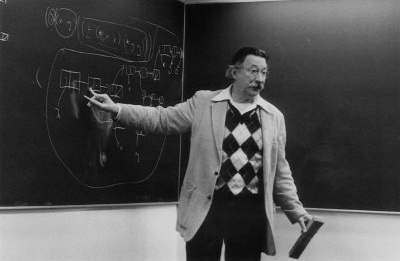
Contact
Magnus Rust MA
Assistant / PhD candidateAssistant / PhD candidate
Holbeinstrasse 12
4051 Basel
Schweiz
The Autonomous Self in the Age of Automation. Joseph Weizenbaum and the Intellectual History of AI Criticism, c. 1950-1990
Technological innovations lead irrevocably to a loss of autonomy and to the alienation of man from himself. This diagnosis has accompanied industrialized countries since their emergence. But is there really such a thing as a dystopian technology spiral?
The research project investigates for the first time the life and work work of the German-American computer science pioneer and social critic Joseph Weizenbaum (1923-2008) and asks the question: What did the mutual development of computer technology and computer criticism look like?
So far, anecdotal reviews have mostly condensed Weizenbaum’s life to two milestones: First, 1966 publication of the program ELIZA/DOCTOR, which is considered the first chatbot in computer history. Second, publication of his 1976 technology-critical book “Computer Power and Human Reason”, which is still received in German-speaking countries today.
The work follows Weizenbaum’s biographical traces and attempts to understand the thought collectives and milieus in which he moved. It begins with his work on the ERMA automated cheque system in the 1950s. In the early 1960s, he made his first contacts with local psychiatrists in the Californian Bay Area, who had a decisive influence on the research layout of his later chat program ELIZA/DOCTOR. As a computer science professor at the elite university MIT, he increasingly appeared as a critic of technology and society from the 1970s onwards and was given a label that he made his own until his death: heretic of computer science. From the 1980s, secured through his MIT professorship, he became a full-time critic of technology, moving between the USA and West Germany.
The project traces Weizenbaum’s work in the intellectual moiré of his time influenced by cybernetics and computer development, by the Shoah, the civil rights movement and the Vietnam War, by a European humanist tradition and a technological utopianism in the research field of artificial intelligence (AI). The focus is on the critical reconstruction of Weizenbaum’s entanglements with opponents such as Marvin Minsky, Seymour Papert and Hans Moravec, as well as with like-minded people such as Lewis Mumford, Robert Jungk, Hubert Dreyfus, Herbert Marcuse and Hannah Arendt. Archival material from MIT, Stanford and Harvard shows how differently people have conceptualized and evaluated the new computer technologies since the 1960s.
In the wake of Weizenbaum’s life, the distortions and contingencies of recent computer science history, which form the basis of our current information age, can be understood. Following Weizenbaum means understanding the origins of AI, digitalization, machine learning, and contemporary criticism of the web.
